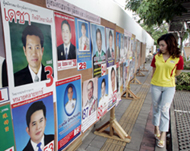Thais vote for senate amid violence
Thailand has voted to elect a new senate to a backdrop of violence in the south of the country and fears the result could lead to repeats of mass anti-government demonstrations last month.

Suspected insurgents were believed to be responsible for five attacks that left two police officers and an election volunteer dead, according to local police in the predominantly Muslim south of the country.
Two of the attacks occurred after polls had closed in the Malay-speaking province of Narathiwat.
Many observers believe the poll could re-ignite a campaign against Thaksin Shinawatra, who stood down as prime minister this month after a general election.
The 200-seat upper house is supposedly neutral, with a ban on candidates having any political affiliation.
Checks and balances
The senate is designed to act as a balance and can block legislation as well as appoint members of anti-corruption agencies.
However, about 50 candidates for the senate are related to members of Thaksin’s ruling Thai Raik Thai party and opponents say this will create a more partisan body.
 |
|
Many Thais apparently do not |
They say that despite stepping down, Thaksin intends to return to the political fold and that controlling the senate may be part of such a strategy.
One outgoing senator, Somkiat Onwimon, said: “I foresee a worse political crisis in which the Thai Rak Thai-dominated senate will appoint their people to sit on independent watchdog agencies like the anti-graft body and the election commission.”
But some analysts say the new senate could help resolve the constitutional chaos left by the general election on April 2 that was boycotted by opposition parties.
Constitutional question
The poll left the lower house of parliament with empty seats and unable to convene. Until it does meet, a new prime minister cannot be elected and a new government formed.
Unlike the general election, the senate poll will produce a full house which can be convened. It could then ask the Constitutional Court to rule on whether the lower house can meet without its full complement of members.
Thaksin, who remains prime minister officially but will not be a candidate when the lower house finally convenes, has handed power to his deputy, Chidchai Vanasatidya.
The opposition, led by the Democrats party, and street protest leaders are demanding constitutional reform and new elections, arguing that Thaksin systematically gutted all neutral bodies meant to scrutinise the workings of government.
More than 44 million Thais are eligible to vote for the 1,500 candidates vying for a single six-year term in the senate.
Opinion polls show that many voters are not clear on the role of the senate and turnout is expected to be low, prompting fears of vote buying.